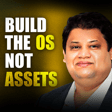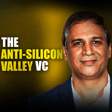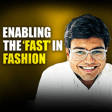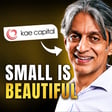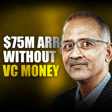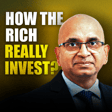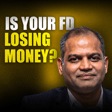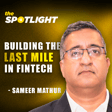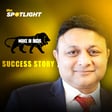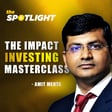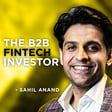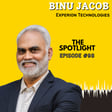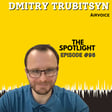Become a Creator today!Start creating today - Share your story with the world!
Start for free
00:00:00
00:00:01

Transforming traditional washrooms | Euronics
Modern washrooms in airports and corporate offices have evolved into style statements, offering both an elegant look and an exceptional user experience.
In this episode, Viknesh Jain, CEO & MD of Euronics, shares how a chance brainstorming session with a distributor sparked the creation of India’s largest washroom automation brand.
With around 600 SKUs and ₹200 crores in revenue for the last financial year, discover how this bootstrapped company leveraged Bollywood celebrity endorsements, embraced technology to better understand customer needs, and capitalized on the surge in demand for automated accessories driven by the COVID-19 pandemic.
Transcript
Introduction and Early Career
00:00:00
Speaker
Yeah, hi, my name is Viknese Jain and I'm managing the director and CEO of a company called Euronix. We are into public bathroom automation and accessories.
00:00:22
Speaker
Early on, I realized that you know this thing is very boring. I don't want to do this for um my life. But you know again, like an ideal fan, I'm supposed to go there and help him. And then I was doing all this while I was studying. So I never missed school because of this. But in the evening, I never you know kind of I to not allowed to. I didn't go and play with my friends because I was kind of helping my dad on weekends in the evening. So that's how the journey started. and ah do i would I think I was of some help to him, but I didn't
Discovering the Internet and Business Ventures
00:00:57
Speaker
like him that much. So that's how the journey started.
00:01:01
Speaker
And like what led to Euronix? Even I was getting the same stuff in college and then in college that conviction kind of agreed that I didn't want to work with him. And then I just found an excuse that I said, okay, I just want to run away from this entire thing. And then I told my dad that I want to do MBA. yeah And then Monday program, which I did, I was supposed to stay in the cottage. It was like an in-campus situation. So I was living there. I used to come back one weekend.
00:01:33
Speaker
that MB college was very near to mike my place where I was living. And ah so so that one year I kind of took break from visiting him and then doing my stuff. And then, you know, ah during that time, you know, internet just started. i'm I'm talking about 1999. And I was very intrigued by it. I just spent a lot of hours on internet. We had a brand new computer lab. you on So I studied from school of management. and And so that thing kind of expanded me and then I used to help my friends and call it to book hotels, to book pay ticket.
00:02:10
Speaker
to gloop, restaurant e etc. This was becoming my part-time hobby and I was not paid for it. so When India finished, I kind of went back to my dad and I told him that I can't join him because all these years I was kind of experiencing it and my conviction kept on growing that I just can't. join him and he was shocked. He tried to convince me. He tried to be mad at me, but I was kind of very clear that I didn't want to or join him.
00:02:44
Speaker
So he said, okay, what do you want to do? I said, I don't know what I want to do, but I definitely know that I can't do anything. So he kind of, one of his friends was ah making, applying to, and then he encouraged me to kind of become a distributor for him, which I did for two, three months, which I was not again ah liking or enjoying. And then I met a cousin of mine and his uncle, they just imported oil-filled radiators. Those oil heaters that used to come, and that they still come, they became suddenly popular and his uncle couldn't kind of send them. And so he requested me if I can kind of help him, she would thank them in Delhi.
00:03:25
Speaker
So I was again looking for work. I kind of agreed. And I think within two months, I kind of sold all of it and made a good
Founding Euronix and Initial Challenges
00:03:32
Speaker
amount of money. You you sold it to shopkeepers like this. So I yeah i used to be there all the shopkeepers and tell them about this new technology, this new product. And the margins were very high because we were the only brand and company was kind of promoting it at that point of time. So I'm talking about 2000. and year 2000 it's been 24 years since then and so oh yeah that's how the journey started and so again this was a seasonal business October to December we could sell heater and then just 10 months we had nothing to do and then I went um back to this uncle in April and I was like you know I was over the plant for next year and he was like go
00:04:17
Speaker
Man, I'm already 85 years old. I don't want to kind of do this again. I was always stuck and I'm thankful that you kind of helped me get out of that stock situation. So that's that's about it. And then, you know, um I went to China and I spoke to this company and that point of time, they were the largest manufacturers or low meters. And this was a big brand. This was a tiny company called Mydia. They had joined venture with Baraj to make fans and many other companies were making ah world table production fans for them. And so ah they were making oil-free initiatives for us. And then that's how the journey started.
00:05:07
Speaker
And ah with your brand? No, that was Mighty Inc. We were representing Mighty Inc. We did it for two seasons and then we realized that, you know, and this ah when you went to China, like did you have an appointment with them? or How did you figure out that you have to meet Mighty Inc? So, that's a good question. but There was a friend of mine who met a This guy, I told the manager of this guy and in an exhibition in Germany and he took his car and then he kind of shared that visiting card with me. He said, like, you know, this is the guy, probably he should talk to her. So I was already selling my readers like for one reason, which I bought from this uncle and I kind of reached out to him over email because his English was barely understandable at that point of time.
00:05:58
Speaker
So i wrote to him um I emailed to him and he she promptly replied and then we kind of moved on from there and then he said, why don't we come to China? I can show you my factory and the kind of product that we made. So yeah, that was my first travel to China. And you were vegetarian. Yeah, it was very hard for a vegetarian guy to barely survive in China. In those times, I'm sorry, I'm talking about 24 years, but it was, you know, on all the signs were in Chinese, all the people, they're not good at understanding this. So the things were really scary for me at least because I was very young.
00:06:44
Speaker
and Food, of course, was one of the challenges, which was another challenge. And trusting them was also a challenge, because at that point of time, trusting a Chinese company for your money, for the quantity, and for the technology was fairly difficult. so but again ah It was my conviction and so I had to do it. So I did it. Yeah. Okay. So for two years, you sold them idea heaters. My idea heaters, but then I realized second year, they kind of appointed one more distributor without telling us.
00:07:19
Speaker
It was kind of a live reach of contract. And then I realized then, you know, lifting is not worth me. So I kind of need to break this partnership. And that in 2002, I announced this brand, Euronix. So ah it was a very funny story. I was like, I i told ah my dad that, you know, I want to launch my rally. He said, what do you want to do? I said, I don't know what I want to do with this brand. But I just want to launch this brand and then I will kind of figure out what to do because after this debacle of trusting a large company, a large brand, after this setback, it's hard for me to trust any brand not to do this to me again. like I kind of registered this brand in 2002.
00:08:08
Speaker
and ah Then, ah i so ah one I went to the long gi um a company called Delongi. It was an Italian company. They are very famous for coffee machines and all of that. and We started representing Delongi to sell their roomiters in India, same also later. And simultaneously, I dined up with a Chinese company to manufacture these orphanages in the name of Huronic. So, now we were representing two brands. One was the Omni, which was
00:08:44
Speaker
ah abandon company And then I launched my own brand, with the room, and then we were kind of, and we were also settling with one brand because when you we used to go with, when we used to go with, that when we used to represent a brand and go to places, say like Khan Market in Delhi, they were like multiple retailers sending those eaters. And all of them used to say that, you know, we want to make snooze for this brand. If you're sending out a brand, then you can't sell this brand to anyone else in the Khan market. So we were kind of struggling and similar situation happened in various other markets in Delhi where they were one retailer was like, he wanted that brand to be only available to him and not without a brand.
00:09:31
Speaker
So I thought, this is a good opportunity. I can represent two brands. One is my own brand, which is Euronic. One is Delongi. So I can now work with two retailers in the same vicinity. So that's how Delongi started. Again, after second season, 2002-2003, Delongi did the same thing. ah They appointed multiple distributors without telling us. ah Again, private class. So I was like, no. ah my conviction towards not working for another brand kind of grew more stronger.
Transition to Direct Sales and CRM Innovation
00:10:06
Speaker
And I was like, okay, this is the last time I'm implementing a brand. I can't be doing this. And that was it. We broke off that partnership.
00:10:17
Speaker
And ah in the in ah in the meantime, for three years of sending these heaters, I realized that it's a great business, but it's a very seasonal business. We get business for three or four months, and then yeah around nine or ten months, we are just sitting in the island, don't know what else to do. So we had a distributor, his name was Sharmadi, and then we were discussing you know what kind of product can we launch. And he was like, you know, ah we were brainstorming a lot of products. And then one of this product kind of, or idea came on the table that, you know, there are a lot of public bathroom, video and the the condition of public bathroom in India right then was like really shit. And so he was like, you know, let get some of these products which would enable bathroom automation. And one of the product which he just said, we must introduce hand dryer.
00:11:17
Speaker
I said, okay, ah by that time I already traveled to China a couple of times and I went to and that's how journey started. We got the container. ah So this was a German company which had a new plant in China and we had a collaboration with them and then they were very excited to come to India. But the condition was that you they need to be contract manufacturer for us. and they need to kind of make things for us.
00:11:48
Speaker
this one
00:11:58
Speaker
Yeah, am I already good? Yeah. Yeah, so that's how the journey started. We started importing. What do you mean? They need to be contract manufacturers. You need to say they didn't want to They were okay with you putting the ironic brand. They need that you need to tell good ah in their own brand. I was like, and i that no way this is not happening. I have my own brand and I need to, you just need to manufacture good for that. If you want to do this, very good. If you can't, really can't.
00:12:31
Speaker
They kind of agreed to do that. And we got the first shipment. I still remember that was July. And know July of 2004. And that was July of 2012. And so, well, I called up Swarimadee and we didn't come to Swarid. And Vai picked up the phone and she started crying. And then I was like, But the end is good. And then I spoke to his friend, he's like, my father met him in an accident. David saw yesterday and he lost all his memory. He can't recognize any of that.
00:13:10
Speaker
So first I thought that, you know, they are scamming, and probably, sure so I went to their room to see how he is, and then suddenly I realized that, you know, yeah they were drooling on a stage, and and he could he could recognize me, and he was it was very hard for him to breathe and speak. So I was thankful that, you know, at least he survived that accident because in those days, so there was no, not much, ah like most of the people were running two wheelers without helmets and stuff like that. So, so ah that was the situation. And ah I came back. How big was this shipment of handrails? This shipment was 123 container. How many handrails is that? That would be around 1,500. Okay. So,
00:14:09
Speaker
So I came back to know what else to do, to create. I was like, don't know what what else to do. Then um I realized that, you know, Denny is not the market because Kurgaon was just a very brand new, like two, three years. There was some IT company, they referred me to a new building. Fiber City was in that instruction. And then I realized, you know, most of the IT companies, they are the buyers for these products. Most of them were great. It is like Meinloch and Hyderabad. Pune, but these cities were like, you know, I still remember in port first whole campus, it was like amazing, you know, and ah and when I spoke to somebody in person, they're like, you know, most of the people who were like an educator from IIT or IAM, they were going to um Western countries like US or London or Europe. They didn't want to stay back in India. So this was one of the important way of
00:15:09
Speaker
You kind of stopped paying or restricting brain drain. So, this they were building great campuses and I was at least overwhelmed when I saw their first campus. And ah so, that's how Journey started. I realized that Nanjol, Hyderabad, Chennai are the right market. ah So, I started looking for the other distributor. I used to get the yellow credit from the market. I used to sell to other prospective dealers who could sell my product. I used to sell them. I used to send them a brochure account. And they were really excited by the design technology that I had brought at that point of time. I think at that point of time, we were much, much ahead of time.
00:15:52
Speaker
and and The technology, the product, and the quality and the price, what he offered was nothing what India had seen at that point. I'm talking about 2004-2005. So that was instant success. I was able to share a lot of my stuff within two months. And then I realized I'm trying to solve a problem which India is shaking at scale. And I realized that India is still becoming tech superpowers, like the service provider of the world. And this is just for the scale. And we had first move advantage.
00:16:32
Speaker
and you know We were like first go to brands for all these products. And then we soon added more products like automatic corsets, automatic utensils, soap dispensers and paper dispensers. Now we have close to 600 SQLs, but we started with G or C which kept on and adding more. ah Soon we realized in 2005 and 2006 that dealers and distributors were not not able to represent the way that we want them to represent. But initially you said that you found on Yellow Pages, you found whom? Dealers or officers? To whom you were saying? No, dealers. But we realized that, you know,
00:17:20
Speaker
um They are probably not able to represent ah the way we want them to represent and then I kind of deep dive into the entire situation um and they were like, you know, so because we get limited credit from from you and we but by oh ah we just are able to sell your furniture. So in a bathroom, we are now representing four brands which are offering similar stuff and you are one of them. But if you if you increase our credit, you probably we can sell more of your stuff. but
00:17:56
Speaker
ah ah Before that, oh you know, I started learning Google ad because as I told you, I was very much interested in jackson technology. Google was still a startup. I'm talking about 2002, 2003, 2003. And then I used to call them at night at like 20 o'clock at night. And they used to kind of teach me how to run Google ad. And probably we are amongst all 20 Google customers in India. And um all these ads were highly successful. Back then, you you know, the cost of running these ads was very high because we had no computation at least in our category. And ah so we used to get more traffic from mostly from the IT companies in child who were in very tech-savvy and they were not using allocated but Google and Yahoo too.
00:18:50
Speaker
these kind of products, because these kind of products were not even available in retail market. They could just go out in a market and find these kind of products. So I was getting a lot of news and I was kind of transferring all the leads to my readers. And then I realized that they are not able to represent. I'm not getting enough news from them. I'm doing so much of hard work stuff, blah, blah, blah. So it was, That was the situation and I kind of con confronted with three of them. I mainly remembered, I asked this lady, you know, why can't you invent more in the business? She's like, whatever money I make, um so I just bought a DJ thing, penthouse. I just bought a Mercedes, so all the money that I make by selling the product, that is going toward EMI.
00:19:45
Speaker
you some there a piece of real estate that I bought on the brand new car. And i'm just a I'm just able to pay you off, ah you know, if I'm left with something. But she was really, he was kind of teasing me with that situation and then with checks I used to get. was 2,000 texts. So once I remember, I was supposed to take one like rookies from her and then she, he gave me 50 texts of 2,000 each or something like that. And then, and then I was like, these are like post stated texts. These were like trigger points, you know, it's my money, which I'm kind of begging from them. And then in those days, they were fee form situation. It was very hard to get fee from
00:20:29
Speaker
from all these people because they used to buy own fee form from other companies to spend on credit or on on cash to their, to their customers. So it was very hard. What is the um but fee The near to you is to do an interstate billing for 2%. And then they are supposed to sell in their, they are supposed to deposit fail path in their respective state. Then the impact department will give them a fee form which they will in turn give it to us. So it was a kind of a transaction to make sure that syntax has been paid on that particular amount. So there was some shady business which was going on. They were not paying fee form to us. We were depositing a lot of penalty to the central government in absence of the fee form.
00:21:18
Speaker
So that's how we were small quantity. Trigger point and then I, my customer used to call we me that we had reached, I'm going to need four days back, but not no one had showed up. So then I used to call these people. They were like, you know, I don't have time, and be all of that. So, so the consumer at experience was not that good. And by this time, what was your revenue like? no So revenue probably would be around threefold road. Yeah, and that was around less than five roads. So that's how things started. And then I said, this thing is not working. Let let me again take a hard step. So at that point of time, they were around 10 to 12 dealers in different cities. We kind of terminated all of them in the month of August or September. I still remember. This was the year 2006.
00:22:18
Speaker
or several. Then we started um opening the offices, first one was in Bangalore, Chennai, Hyderabad. So we opened three offices in a matter of six months. we
00:22:33
Speaker
deployed ourselves in service chain and we are huge at home because by that time Google was firing, we were getting dozens of needs, every day we were kind of transferring and we were going, they were they weren representing the full view on its range to all the increased the range. What did you? so So, as I said, we introduced a various design, automatic work page, automatic unit, work from panel. So, but by that time, you already had to know the third people.
00:23:10
Speaker
And it all ah and and the need of the order value per need suddenly increased. As I told you, these dealers were representing 3-4 other brands. um When our people were going, they were only representing eon ordervaluing the value increase, number of conversions increased. Profits increased because oh we were yeah we were the our prices to the hand consumer ah were more than what we used to charge dealers or distributors. The payment cycle increased because we were getting paid faster, so everything increased. We were very happy and we were getting a lot of needs from Google.
00:23:49
Speaker
But then we so soon realized that, you know, everything was hunky-dory. Then we soon realized that, you know, it was very hard for us to ah work on Excel because we were getting a lot of data, a lot of leads, and it was very hard to manage that. And then we realized we need to build our own tech. um To manage this entire operational heavy operation heavy business because ah You know, we got very inspired from companies like you like a whole empty fire. We were like very big enough institution way to be kind of a
00:24:23
Speaker
situation. So, we would like if Yureka hopes he can do it again. If he can do why can't we sell thousands of Macs per window, enter private with our products without ah having any need or receipt because in those times, it was very scary to operate ah no business which is related to construction industry without a dealer distributor. Even now, I think ah there have been very few companies in India who have been able to crack ah institutional B2B sales business which is direct to the end consumer without involving any dealer or distributor.
Expansion and Customer Service Solutions
00:25:03
Speaker
yeah i pay what you that What is the value out of the dealer slash distributor? Why is it hard to build without them? Basically, you know, the it's a lot of hard work, first of all, to build a large team and also that, you know, ah ah fifty More 50% of this thing happens on credit, even now. So, most enterprises don't want to take this risk of giving credit to enterprises because they're like, you know,
00:25:34
Speaker
oh they don't want that They don't want to oh ah represent, they don't want to reach out to small enterprises or medium enterprises. Even if they are doing enterprise teams, they will just meet Tata or Mahani or Mahani of the world. They will not go through mid-level or whenever enterprises to solve the problem because when they are not able to build an arts, institutional teams team and also that ah When they started, they appointed dealers and distributors. Now, if they want to go directly to the enterprise, there is a kind of a revolt situation ah or an anger situation from dealers and distributors like yeah if you are going directly to the enterprises and challenge your stuff be what what what um may ah may big out mar room me i if i and and then we will blackmail your brand and we will not sell some competitors' brands. I think in that situation, a lot of brands are stuck up in this situation. A very good friend of mine was into building material space. you he For the longest time, he wants to go on Amazon.
00:26:50
Speaker
and clip content on the marketplaces, and every time he attempts to do that, there's a reward situation from dealers that, you know, if you do this, we'll stop sending you. So, if you go directly to the end consumer, they stop sending you stuff. So a lot of people fail the situation and they are not able to take it out of the decision. And they are being arrested by the channel failed, which was very rampant by men, which is also very rampant now. So it's like a cash flow situation for most drag. Okay. Interesting. Yeah.
00:27:26
Speaker
So you wanted to do the Eureka Forbes model or the ceasefire model. Yeah, that's how we started rear ah working. ah So we realized, you know, we can't do this on Excel because if thousands and thousands of data we have to manage and it's a very operational everything because we are doing all the work which dealer is supposed to do, which distributor is supposed to do, we are doing all that work outside even if somebody is asking for one piece we are delivering
00:27:57
Speaker
and so in became a video you wouldn it like you would do installation after sales, everything. Yeah. Okay. Yeah. That is extremely complex, which is what I think your eco forms also has cracked. I guess they would, you could in a way call them the original D2C company. the way yeah So you had to wind up a salesforce and a service force. We had to wind up a salesforce. At that point of time, there was a, you know, a startup, a very large company, you know, called Salesforce. So we kind of started with that, but soon we realized it's very irritating to work on that because, you know, I used to have a lot of ideas and I used to, they did not have any incremental. There was one guy who knew Salesforce, he used to come to my home and teach me.
00:28:47
Speaker
So I had to get a lot of ideas, I had to reach out to them, they would come back. And what were you using Salesforce for? Like for maintaining customer? We It was It was a CRM. So for lead management, ah for creating opportunities, for sending quotations and all of that. So, I had a lot of ideas. I used to note down and then I used to call him. He said, okay, he made me come back with a petition. They would come back with a petition and go three weeks. By that time, more ideas had popped up. So, it was not going anywhere. And then I kind of irritated. And then I met a guy in like, he was one of the top 50 Yatra employees.
00:29:38
Speaker
at that point of time and then he was like, I can help you build it. This is like fairly easy and I'm free on Saturdays and Sundays, so I can come and do this stuff. So he used to come on Saturdays, Sundays, he used to sit together, code. So I never knew coding, I still don't. So he used to code and so he was able to build something.
00:30:02
Speaker
in about six weeks, we could immediately start the evening. And then and every Saturday I used to come, I to i might i was ready with 10 more round ideas, I used to implement some of them. And then this thing kind of happened and then after three weeks or four weeks, I still remember he was like, you know, I can't do this as a full-time job. So your idea requires somebody use a full-time resource, I can't do it. So, we have to hire one resource. So, all I didn't remember, you know, we could hire our first coder for like 13,000 rupees. I knew well but and ah to finder driver was driver at next use. I just don't want to be in any job profile. But yeah, it was so key back then. that by ane goes And kind of came to my mind.
00:30:53
Speaker
and ah ah We had one folder, two folder, three folder. I like within next two, three years. When you had your first quarter? That was back, I think 2009 or 10. And what was your annual revenue? By that time we had reached say around 9 crores or 10 crores, something like that. Yeah, yeah. 15-20% of growths. I would say 20-25%. Okay, okay. Then ah we started winning our own yeah ERP because we have a lot of insurance with respect to payment collection.
00:31:40
Speaker
So it started in a small small model, deal one was for payment collection, one was for refund collection, one was for warranty management. So we started building more ERP because we realized we have a tech team, we can do whatever we want. So we suddenly felt very empowered with respect to tech open. and So basically we started this, we were very successful, we were enjoying all of it. And we started growing after 2012, 13, I feel were like it was a kind of a plateau because the same scheme which we initially deployed, they were getting very incumbent. ah They were kind of getting very lazy. We were also kind of re sometimes out of idea, you know, what next, what next?
00:32:31
Speaker
and ah also ah this around 2098 and 1121 getting the super deal because of deposit the global meltdown and all these tech operations, they stopped getting because they were not getting enough English from the euro. Yeah, ah you were asking. to Yeah, this is what I was asking. that bathrooms have been getting better. Like the standard of what do you expect in the public and goes up continuously, you know, like when we were in school, the kind of toilets we had in school, is that why they never in today, like even a school toilet has an automated faucet. So so yeah I mean, the market should have just kept on growing. That's what I was wondering. You know, the, I think there was,
00:33:25
Speaker
ah they didn't They wanted to say more. the There was still a very conservative mindset. Was there a competition factor also? At that time, no. At that time, no. And American company? ah were manipulatd They They have some distribution in India. But every time it was like 3 months and their technology was made for the European and American market. market That's ah what we cried actually. We built products for India ah because the Indian water and electricity situation was very bad. that The water was very dirty, electricity was very sporadic. So we built products which were made for India.
00:34:07
Speaker
of So BAM, I still remember back then there was a Domino's ad which used to come, you know, 30 minutes away and I took pizza free. I used to tell my team, you know, that this is a company which can take orders on cold, which but caning kind of make a pizza, bake it and deliver it without Google Maps in 30 minutes. Why can't we at least pass all the orders in 30 minutes? So that was again one of the, but we were, ah One of the few companies in our space were kind of promising this kind of stuff that whatever order we get till fixed, we have to use privacy advantage. Still, him made me abide for that. They are ready to come to me and they have been able to do that. But these are small small things which we started doing and we started to ah get a lot of connection. and um and What was your revenue at 2013 during thousand thirteen plateau?
00:35:04
Speaker
oh I would say around 20, 25 year old, 20 year old. In Dublin, like three years, like 2009, you were about 10 years. It was doubling, but it was, ah I would say, it was doubling. Not Dabhaat, Dublin, more official, 4 years. yeah so Again, 25% you went back. So, earlier 25% growth used to seem very exciting, but then it kind of became a high weight. You like Tulkini, right? So,
00:35:37
Speaker
ah so so the things were getting very irritating. then we and one question here for study but you go Till now, you are still getting it contract manufactured inside till 2013? No, then in 2014-15, we started contract manufacturing in India. By that time, around 25% of the product was made in India, but not in our factory. That was the way through the other contract management.
00:36:09
Speaker
guarded yeah so please get um In 2040-50, as I said, I was again interested in what was happening. There were equally ah companies like Uber um move along witharte door um community yeah and India. And I'm really interested by the way they were operating. the And one of the things which kind of hit me was the review mechanism back then. Whenever you do a Uber ride, you would take a review. Whenever you order something on Amazon, you would take a review. And then, we were always a consumer of that company, but that obsession kind of grew more and more when we started taking a review on everything.
00:36:54
Speaker
A service transaction and then we started to get a lot of insight what customers want, what customers don't want. So that shift from winning an ERP was kind of shifting to winning more hours for the customer, for the engineer, how could we deliver better product faster. ah more affordable, better technology, direct interaction with the customers. So we started using technology to get us bettering heights for what customers want. And I think that kind of helped us to take us to the next meet. After 2016, I think that that kind of propelled and you know new airports were being built, new IT companies. Buddha was suddenly becoming
00:37:43
Speaker
a sprawling city and not only go down, right down, and so I think I'm talking about 10 years back where the government started. It was in power. It's been 10 years. I think suddenly the investor companies increased, the RDA increased, all the purchase pilot companies started to come to India. Interesting to see the next level. So I think a lot of growth happened in the last 10 years. that sha me I will not say suddenly, but gradually accelerated. And we also had no contradiction that, you know, the potential of India, Germany, the brain brain stopped. A lot of people who had moved abroad had it coming back.
Impact of COVID-19 and Future Plans
00:38:26
Speaker
They built a great enterprise. The unicorn culture was kind of, till now, earlier only fortune fighter companies were customers, but non not all all the unicorns were customers.
00:38:37
Speaker
and So, and I think one of the biggest ah change that we saw in our industry was COVID because ah Before COVID, a lot of these products were a luxury, but in COVID-19, people felt that they could not touch anything in a public bathroom or a common bathroom. So they were scared to touch a hand dryer, they were scared to touch a soap dispenser or a paper. So everything became better. And I think COVID was good and bad for us.
00:39:10
Speaker
for at least one and a half years because they were suddenly made for all these automation bad because all these projects suddenly stopped. There was no construction happening for a year or so. So, yeah, I think COVID kind of did for us what ah kind of demonetization did for ATM and other one is company suddenly change of shift. So, ah What was the revenue? 31st March, 2020. Pre-COVID, we were like around 1065, 70 grand. Okay. Yeah, we were around 70 grand. And in 2020, pre-COVID we were like 70 grand. And 2020, 2021, we like suddenly jumped by around 40%. And then 2021, we
00:40:06
Speaker
a ritigvoshin, a ritigvoshin, on Boreda and we were so excited, we were looking for a brand. What do you think about Boreda? Wasn't it? Shouldn't it be the other way around, like you or Boreda? Yeah, so I kind of retrained myself. So, 2021, we were looking for a brand, Ambarshita, and we were talking to a lot of within team and
00:40:36
Speaker
There were other choices, of course, I can't name them, but we finally connected, edited Roshan, and he thankfully agreed to ah partner with her, and those are, and those you're on it. By that, you would have crossed the letters. Yeah, am by by that time, he was like 110, 120 yards. And that was one of the overcome moments, I think, I think Covid-19 had just stopped. People were not ah treating this as a luxury to others, but it was a necessity.
00:41:12
Speaker
We launched a large digital campaign with the discussion. I think that 21 quite frankly was amazing years for us, not only because of the campaign and association with the discussion, but also, you know, India was just going to the next direction. They wanted to help people because the airports which were undergoing ah through innovation or they were brand new airport. under Ulan's king, which was launched. One day, Maharaj trains were launched. So yeah India was in crazy growth in the interest of here.
00:41:53
Speaker
Government buildings were made like never before. I still remember pre-COVID or probitallions like the state of government buildings were really bad to go into any government office like but a ni police station or a contact DSC office or income tax office or a customer office. But the situation was really, really, really bad. But now if to go there, you will be really amazed the kind of infrastructure that government is making. ah Like, we did this new Parliament House, we did this new G20, Mandapam and we did all the brand new reports, like that is in Bangalore, Bombay, Delhi. It's amazing to see where in involved going, it's amazing to see and the current infrastructure, the quantity of it, the good scale of it, the speed of it. It's truly amazing and we are really excited to be a part of this new India, new Bharat.
00:42:48
Speaker
What was your turn on this financial year which closed? This financial year we closed at around 200. And how do you expect you'll close this 25? This financial year we are expecting around 280 to 300. I think every year 30 to 40% that's what we're expecting and I think we are pretty much excited.
00:43:18
Speaker
Okay. Okay. This must be a pretty large market, right? Like thousands of crores types or maybe and them no not really because one, ah first, so how do you define the market? Do you define it as every office or how do you define? I define a market where, so so we have two kinds of market, one is the public bathroom, one is the common bathroom, the public bathroom is making like airport shopping mall, hospital wait and just go and use the bathroom. Common bathroom is something which is very common to office, where nobody, this outside account is locked in.
00:43:57
Speaker
Office is a common battle. So, the market is getting large, as I said before, COVID-19 products are not used. Now, they are. So, all the people who are going into renovation, they are using a lot of automation. People whose offices are old, of course, are old. They are kind of not so much but renovating them. But still, most of the sales that we see kind of come from ah large companies where there are more than 100 employees being employed, ah small offices where they are like 10, 20, 30 employees, they are still not using a lot of automation for various vehicles including cars.
00:44:39
Speaker
but most of our customers are enterprises where there are more than 100 to 100, at least people working. For example, Infosay, TPA, Accenture, they are one of our large customers and they are, for example, 300,000 people working in Infosay, around 500,000 people working in TPA. ah we So these are our large customers. We have been focusing on these large enterprises, that's where we get volume. Now, not of a lot of small enterprises, small business is kind of shifted to Amazon, ah where they ah go to Amazon or other marketplaces to buy small quantity, ah which we are also not able to entertain because
00:45:30
Speaker
ah hard for us at this point of time, we are getting smallest customers. But of course, there are people who go to Amazon and buy Arthon, right? And there are other brands too. So yeah, the small market is lonely. If they go to market nations and large enterprises again, they don't go to market nations to buy Arthon. They call out, they want presentation, they want market, they want sampling, they want credit, they want GST in worship. They ah mostly don't go to market places to buy people. Okay. Would it be fair to say that, essentially, Euronix is where there is automation? Where comes the cups automation in the bathroom? Yeah, absolutely. Like a plain vanilla toilet, accessories, or like the pots and the washbasins and all, that's not really... No, our poor expertise is bathroom automation.
00:46:26
Speaker
ah Common and public bathroom ah automation. um That's what we focus on. Okay. I understand. So you're in the automation. um You spoke of building apps for your customers also. What what what did you mean by that? I was wondering about that. So basically, we ah but we built an app for our engineering. So whatever the jobs we used to get, we used to kind of allocate them on this app. They could see how far the customer is. He could ah basically open this app and take reviews from the customer, you know, how did he perform, can take pictures of the product, and then that app was backwardly integrated to our ERP.
00:47:13
Speaker
So the idea was to improve consumer experience, to improve the experience of our people because they were having a hard time to find the location. So they could just open the app and then the app would take them to a Google map or something like that. So that it was easier for them to track. It was easier for him to, for them to take reviews. It was easier for them to take pictures and no one in the library. So these were at were making most, mostly it was for internal use them. Okay. Okay. Got it. Got it. I was wondering like, you know, in terms of like some IoT and that kind of stuff, is it there yet in the bathroom? auto So IoT, we have, we have, we have been prototyping in 2002, where we built IoT, because most of these companies were struggling, you know, ah for example, mega airport, they have more than 2000 different things.
00:48:07
Speaker
It was very hard for them to deploy and it was also very costly for them to deploy hundreds of people to check whether there but but whether they have any type of equipment. It was very expensive. and ah hard for them to check and whenever a applied comes in all the liquid is gone and then someone eighty and someone walks in after them. He's not able to find soap or tissue paper or hand sanitizer. So to solve that problem, we built a technology where we would upgrade news this dispenser. We were successfully able to a kind of build it, test it, but we were not able to scale it.
00:48:50
Speaker
um because what happened was that um all All this technology required a thin connection or a Wi-Fi. And it was impossible for these airports or these enterprises to get thousands and thousands of things from Can you come up with it and it was also very costly. And it was also they didn't want to give us the Wi-Fi network because oh it was very secure network and they didn't want to give it to us.
00:49:22
Speaker
So that's kind of project train. Now we are working on a ah different technology. We have a launch today and I think here we are testing it another two, three months. It should be out where we will be able to give that service to our customers and some people who are to enterprise who are not even a customer that they will be able to get WhatsApp and email notification. on which this sensor needs attention because there is no permeable inside them. or So, we are just testing it, I think by Diwali we will be able to learn.
00:50:04
Speaker
how How did you build this? yeah This was not built on the same base. No, this is a new technology. We are kind of secretive. Unless are able to roll it out, and of course, we'll be able to give more details about this technology. But I've been told to keep it secret until you launch this technology. <unk> Okay. like miss and and So they this would directly integrate WhatsApp, they don't need a password. No, no, no. This can be directly integrated with the WhatsApp. You just get a notification that day.
00:50:45
Speaker
Do you have like a weight? and number click fix so so they We are working on various things. it ah up It's a combination of weight, it's combination of ah how many times it has functioned when the when it was born. So it is a combination of at least four factors. If not only one factor, that's why we've been texting very aggressively. Okay. In your revenue split, like how much comes from government? How much comes from corporate? I think about 8-7-8% only right now. That's it. And airports you consider as government or? Yeah, airports are government. Okay. Around 10% is government. 10% is government. 90% is still corporates. Okay. Yeah. Okay.
00:51:39
Speaker
that sort of so
00:51:42
Speaker
It is kind of unusual for companies which are purely selling products to large corporations to use, like a Bollywood ambassador. ah You know, what we do choose to take and did it. And was it a worthwhile investment? Are you still investing in that? ah Yeah, definitely. we We started with a one-year contract. Now we, thereafter, renewed it to two more years. So, this year we'll complete a three years of education with Dhrithik Rasi. I think it was a great experience. And you plan to leave further? Yeah, so decide but no no no i think I think it's ah it's a long-term commitment. It's not like a short-term thing.
00:52:27
Speaker
And I think she is always on top of her mind because he is one who stands for health and sickness. And hygiene is, of course, a subset of health and sickness. So we couldn't think of any other name apart from the Illithic Ocean. And he's so popular amongst people from the age of 15 to probably 55 because he's been in the streets for more than 20 years. ah I think we couldn't think of any of that. When you're essentially influencing procurements in a company, right? They would evaluate you, basis, technical spec, would be some sort of RFP process. and we so So of course, that that always there, that never going to change and it should be like that also. If you are ah if fear
00:53:21
Speaker
If you are asking this question with respect to what is the use of random math in August exercise, that is the question, yes yeah then random math never influences a person to pinch towards the brand. It never so happens. It just gives them a confidence to call you on the table. to just give you a presentation. Of course, at the end of the trip, the day you thought about product, price, and performance. But they just create a window for you to enter inside a door. They never help you get any kind of treatment. Okay. Okay. Okay. Okay. They basically bring awareness that, okay. yeah ah Okay. Hey, we are there. Yeah. Okay. Yes. Okay.
00:54:14
Speaker
and ah like you know Do you stand rely on Google ads for leads or how does your sales? I think 70-80% of their Google ads, but of course, LinkedIn came later. A little bit of Instagram, but Instagram, our audience is certainly not very active. very yes Instagram is more for passion, for luxury juy and all of that. But ah mostly, 35% is Google ads and 15% is LinkedIn. And we are doing a lot of WhatsApp marketing.
00:54:52
Speaker
So that's what we are doing. The first is WhatsApp and Meta, the same company. And then you use WhatsApp to create marketing automation to upsell plus 32 other customers to create awareness. So WhatsApp and then there are a lot of startups who help you automate your marketing on WhatsApp. So I think that's really very successful since last 33 years. So that would be when you already have a lead, then you can show them new products and things like that. So we already have a lead. In our 20 years, we have a database of more than 500,000 actually. Oh wow. Yeah. So that, you know, that's like a thing we can use for obtaining content.
00:55:44
Speaker
you And so, you know, this 250 car sales, how much of that sales is because of digital marketing, the the money that you spend? How much of this is true? Like, say, i think we don't call it we know we don't do ATL, we just do ATL, which is digital. So all of it is digital. No, but of course maybe your team would be doing cold calling and things like that. We don't do cold calling now. thankfully, and it's very hard to do cold counting also. So I would say 50% of the business still comes from digital lead and 50% of business comes from old relationships, new connections, face-to-face meetings and all of that. Okay. And what is your headline? 540 people.
00:56:39
Speaker
Okay. So what is the split of this? How many in sales, how many in tech, how many in service? We have around 190 people. Okay. Now we have around 200 people in manufacturing. Oh, you do in house manufacturing. No, yeah, yeah. Since 2018, 2017 actually, we started in our manufacturing. Now, ah whatever we sell around 65% is made by us, probably by us in India. And ah So 200 are in manufacturing, around 200 are in cave, 190 are in cave, and then around 150, they are in various operations like product development, design, accounts. Where is your plant? So we have three plants, one in Gurgaon, one in Greater Noida, one in Manatee. Okay.
00:57:37
Speaker
So, you know, what's your ah roadmap, like five years down the line? What do you think? What stage? you i think I think now, ah of course, India is a big opportunity. ah America, Europe and the Middle East, especially in the Middle East is a big opportunity. but and um Now, our objectives to scale up our manufacturing, we get required. 150,000 square feet per unit, a few months back. Now the idea is to ah probably buy weight path K of my retractione and start
00:58:14
Speaker
So replicate whatever we did in India, in Middle East, and Europe, and the US. Because if what what we made, it's very hard for them to make because it's a very labor internship situation. And now they've been dependent on China, but now after forward, they don't want to go to China for a big time. They are looking for an option which is affordable, high quality products outside of Japan. And India is a great opportunity. If somebody can produce better quality, affordable products, then India is a great, you know, it's a great place to be ah in India. So that's what they're looking at. It's just about creating an infrastructure which could support their ask. Okay.
00:59:09
Speaker
would Would you like do contract manufacturing for American brands or would you want to go out to the US with your own sales team? We are open to both. We will be happy to launch our own brand. We will be happy to do contract manufacturing. So it's not that we are very closed on one situation. We are open towards both. Okay. And by when do you want to start exporting? I think by this year, by For that you need some sort of- By next month, we'll find out about the topic of Diwali. And yeah, so by the Diwali issue. We already had four things, but very nice one today, very half-hearted one. So now it's going to be a full-fledged unit. You know, what do you see your role as in the company?
01:00:05
Speaker
So my role has continued to be mostly in the strategy, but mostly strategy, product development, talent acquisition, tech. This is what excites me and and digital marketing, of course. ah this is what it is I am not a failed guy that much, but yeah.
01:00:33
Speaker
You're more focused on creating a good customer experience, building awareness. yeah is yeah ah so Let me end with this. What's your advice to young founders? And especially, you know, I've had a lot of guests who raised funding and scaled up, but you're one of the few people and who has raised zero
Advice for Young Founders
01:00:58
Speaker
funding, right? you You've not raised any external funding. Yeah, we are both sharp. yeah and So you own 100% or you have like a co-founder or a partner or someone? No, so me and my brother own 100%. Okay. Okay. So what's your advice to founder in terms of the bootstrap approach? So my advice to founders is do something which you are able to so create an enterprise where you are able to bend your mood, right?
01:01:30
Speaker
It's very important not to be a meat of business. If you are in a meat of business and if you think that you know I can create a large enterprise in a meat to enterprise just by raising funds and probably burning some of it, I think it's very hard to create a long-term profitable successful enterprise ah oh with this kind of money. I think it's very important to find your niche, your product, your expertise, your technology that you're able to build.
01:02:06
Speaker
well ah um ah It's very hard for others to kind of replicate. And what I have understood that it's easier for but need me to create my niche, my category, which is not a very large landscape. Right? If it's a 10,000 corona opportunities, of course, or a 20,000 corona opportunities, there are oh either Adani, the money of the world who will be kind of saving that opportunity or will be chasing that opportunity, now if not now, maybe after three months or six months or a year or two years. So, am I invited to look for small sectors
01:02:52
Speaker
small means which are very profitable, where you can add a lot of value, where you can add technology. And whenever a large company like Amazon or, you know, Indian Enterprises, they will never look at these categories and want to enter them. And then you're like, you know, wouldn't die in that category. So yeah. so yeah they have how How profitable are you? This 250-color top light? It's hard for me to film, but they are a very, very tough-focused. um
01:03:36
Speaker
like 10%, 20% more than that. No, I think much more than that. One of the big reasons is that because we enjoy all the margin that other companies give, they normally give it to distributive dealers, transportation, and all of that. We enjoy all of that and kind of add like to it because we are a direct institution. Okay. And where do you invest that money? I mean, there's only so much you need for lives. Right. So, so, so basically, can you be in web, ah most of it 50% more than.
01:04:08
Speaker
More than 60-70% goes back to the enterprise. As we said, we just acquired a large... So, while this plant is ready, this is going to be world's largest virtual automation plant. And that will be as soon as the end of next year. So, or the so what so ah I think more than 70% go back to the business. And then, of course, we have 30% in other financial instruments. night Essentially, you you you continuously do like building capabilities. Yes, building capabilities,
01:04:50
Speaker
investing in research and technology in design, building large teams, which is difficult to replicate, investing in their training, their development, money opening new offices, marketing, all of that. Amazing. like Thank you so much for the witness. It was a real pleasure. Thank you. Thank you, Akshay. Thank you so much.
